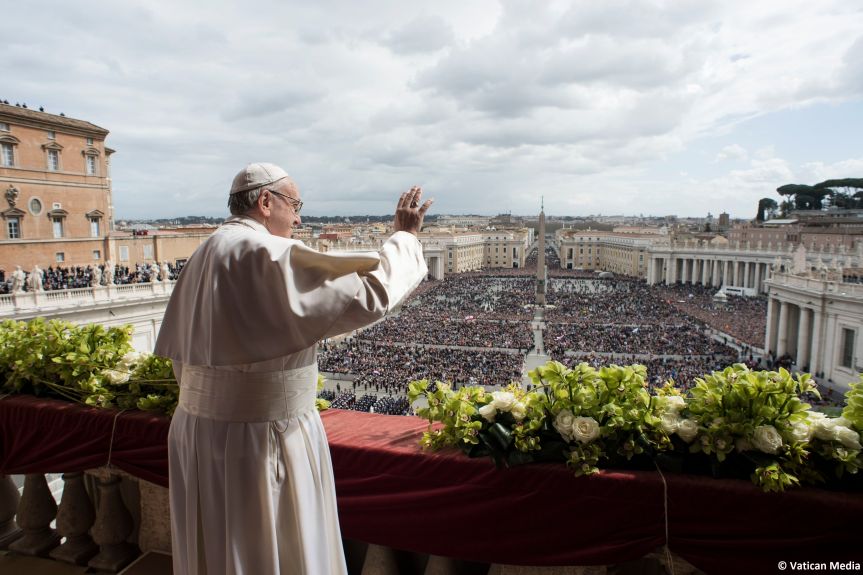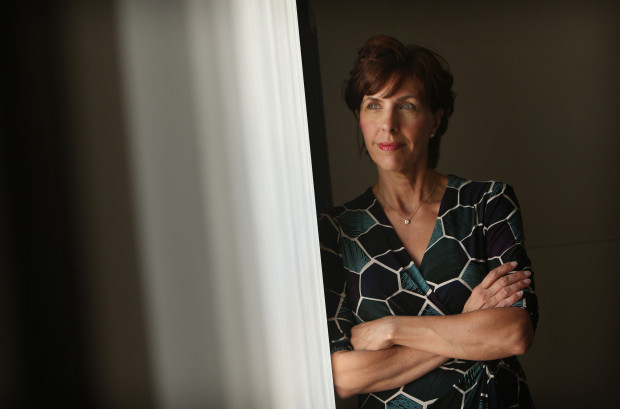Her Brothers Were Molested by a Priest As Kids. Now She’s Trying to Reconcile with the Catholic Church
By Deepa Bharath
For Jennifer Wortham, the process of reconciliation with the Roman Catholic Church began with a six-page letter to Pope Francis. Wortham’s two younger brothers were molested by their parish priest more than three decades ago. In December 2016, the Rancho Mirage resident and healthcare executive faxed the letter to Francis talking about how his acknowledgement of the church’s transgressions touched her deeply.
“I recently came to terms with what happened to my family so many years ago, and I have forgiven those in the Church who were involved in perpetuating and covering up these devastating events,” Wortham wrote. “If we do not open our hearts and forgive all of those who have transgressed against us, we will never experience the joy of grace.” Wortham got a response from the Vatican two days after she sent the fax. The Vatican invited her to meet the pope on Dec. 28, 2016. During that meeting, the pontiff blessed her grandmother’s rosary and graciously accepted her gift — a bird’s nest she had found in her yard — with a little note that read: His love springs eternal. He prayed with her and asked her to pray for him. “I sensed he was serious and that he was touched by my letter,” she said. “I could see that he recognized (clergy sex abuse) as a problem in the church.” But after that 9-minute meeting, Wortham says she was compelled to do more. So, she wrote another letter asking that the pope declare a day of healing in April for victims of sexual abuse. She also wrote a book titled “A Letter to the Pope” released last month, detailing her journey of forgiveness and reconciliation. But, Wortham insists, her forgiveness doesn’t mean she is about let the church off the hook. She wants the church to take a stronger, more emphatic stand against all forms of sexual abuse. “For me, this is just the beginning,” she said. Severe abuse and ongoing trauma The horrific incidents involving Wortham’s brothers occurred mostly at the rectory in Corona where Father Howard Melzer lived, just down the street from St. Matthews Church, which Wortham’s grandparents helped build in 1976. Wortham and her brothers lived with their grandparents at the time because their parents were divorced. “I was very involved with the church,” she said. “I helped sew vestments for the priests. I helped grandma cook dinner for the clergy three times a week.” On Saturday night, priests and seminarians came to her grandparents’ home. They played poker, drank bourbon and ate dinner. It was a tightly knit church family. Wortham was 12, and her brothers were 10 and 8, when the abuse began. The family asked that the men’s last names not be used. Patrick, the older of the two boys, said he and his brother, Michael, would go to the rectory and spend the night. Both were altar boys at the church. “The rectory where the priests lived had pinball machines, a pool table, sodas and big bowls of candy,” said Patrick, now 52. “When you are 10, this is a cool place to be.” But, one morning when Patrick woke up, he says, he found Melzer fondling him. The abuse continued for years. Patrick remembers one instance when the priest asked him to kiss him in the mouth “like he was a woman.” He was 12. Michael said he was molested as well at the rectory and on fishing trips they took together. But, he says, while he was abused on and off for two to three years, his brother endured it for much longer without telling his mother, grandparents or sister. Michael said it also affected his older brother more seriously, taking him down a dark path. “Patrick was a football player and straight A student in middle school,” said Michael, now 50. “But he got into drugs, became very angry and frustrated.” Wortham says she felt tremendous guilt over her brothers’ abuse because it happened under her watch — even if she was herself just a child. When Patrick acted up as a teen, she remembers sending him away to Texas where Melzer was serving as a priest at the time. “My mother and I thought it would do him good to spend the summer with (Melzer), not knowing he had been abusing him,” Wortham said. “As he was leaving, he begged us not to send him. “But we ignored his pleas.” Patrick endured more abuse on that trip and became even more angry and withdrawn when he returned, Wortham said. It wasn’t until her brothers were in their mid-20s that they told their mother and sister about the abuse. Both men filed a civil lawsuit against the Sacred Heart Order to which Melzer belonged. They received what Wortham describes as “a meager financial settlement,” which she said barely covered one year’s worth of psychological counseling. But the men say they still struggle with it — each in his own way. Michael says he has forgiven the church. But he has not forgiven the priest. “I don’t think I’ll be able to forgive him for a long time because he broke us and he has harmed other kids,” he said. “But he hasn’t been held accountable.” Like many other priests accused of sexual abuse, Melzer was transferred from one parish to another and eventually allowed to retire in the church, likely with the full benefits retired priests receive. Both Michael and Patrick say they struggle with their past abuse. “It’s a lifelong torment,” Patrick said. “I’ve contemplated suicide. I’ve struggled with depression.” The simple act of walking into the bathroom and turning on the tap triggers the memory of performing a sexual act for Melzer in a bathroom, he said. He continues to have trouble with intimacy and has been married and divorced once. “The church acknowledging it now is too little too late for me,” he said. “These priests were allowed to do what they did instead of being sent to prison, which is where they belong. “Many of them barely got a slap on the wrist.” Patrick doesn’t think he can ever go back to the Catholic Church — or forgive. He read his sister’s book, but skipped the workbook in the end, a guide to forgiving someone who has wronged you. No healing without justice What Wortham’s brothers are going through is natural, said Esther Miller, a volunteer leader for the Survivors Network of those Abused by Priests or SNAP, in Orange and Los Angeles counties. Miller was abused between 1975 and 1977 by a priest at St. Bridget of Sweden Catholic Church in Van Nuys. She said the trauma from the abuse put a strain on most of her relationships. She has been married four times. “There was a time when my kids didn’t even want to spend Mother’s Day with me,” she said. “That was the person I’d become. “We create secondary victims. It’s a horrific thing.” Miller converted to Judaism and now leads monthly meetings for clergy abuse victims, a space she hopes provides a safe environment where they can learn how to heal. A spokeswoman for the Archdiocese of Los Angeles said they are now required to report any incidents of abuse to law enforcement and that they have a zero tolerance policy of abuse involving minors. Over the last 15 years, the Office of Safeguard the Children at the archdiocese held child abuse prevention training programs for more than 329,000 adults and 1.4 million children and youth. The archdiocese also has a background check program for all church personnel and clergy. Still, advocates like Miller say the church lacks transparency. She cautions survivors of abuse against returning to the church before they have undergone trauma recovery. “Many of us have suffered from ritual abuses, things done with rosaries and candles,” she said. “And those religious artifacts can trigger horrible memories.” Forgiveness? Reconciliation is up to the individual, Miller said. “But forgiveness…that’s a gift a person gives themselves,” she said. “Forgiveness is to let go so the past doesn’t hold you hostage when the triggers show up.” And that’s what Wortham wants for her brothers. She knows the process can be painful. She has had to forgive herself and deal with the guilt of “not taking better care” of her younger brothers. “It has been a journey of not just forgiveness, but also self-healing,” she said. Wortham, who has a doctorate in public health, believes forgiveness can be good for one’s physical and mental health. She pointed to Mayo Clinic studies, which showed letting go and forgiving helps lower blood pressure and strengthens the immune system. While she has forgiven the church and herself, Wortham said she is going to continue advocating for justice for victims and more care and compassion from the church. “Action is necessary,” she said. “The church should commit itself to protecting children, helping heal victims. I feel compelled to fight for these victims and follow through. “The church has acknowledged these crimes, but it hasn’t atoned for it.” The church simply cannot say “sorry” and go about its business, Wortham said, adding that church leaders should take more concrete steps to provide counseling for victims and prevent such incidents in the future — something advocates like Miller don’t believe the church has successfully done. “This is a continuous process,” Wortham said. She hopes the Vatican will take her suggestion and dedicate one day in April to healing and justice. “Healing is important,” she said. “But without justice, there is no healing.” Contact: dbharath@scng.com
|
.
Any original material on these pages is copyright © BishopAccountability.org 2004. Reproduce freely with attribution.

